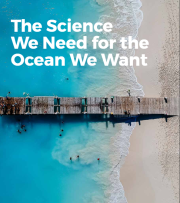22-23 October 2019, Nha Trang, Vietnam. The conclusion of a three-day national training in Vietnam demonstrated the value of WESTPAC in serving its member states’ needs to address their development challenges such as ocean acidification and biodiversity conservation.
The national training was organized by the Institute of Oceanography, Vietnam Academy of Science and Technology, with the support of the USAID Grant programme and the Sub-Commission, with the purpose to increase research capacity of the Vietnam’s young scientist for oceanography and ocean acidification.
This national training workshop focused on molecular techniques for species identification, monitoring the impacts of OA on marine organisms and ecosystems, and ocean forecasting system. Along with lectures, hands on practices were arranged on carbonate chemistry analysis, metabarcoding and single-barcoding for samples collected from the Autonomous Reef Monitoring Structures (ARMS), and use of the Panoply software to generate more ocean forecasting products/results.
WESTPAC commits itself to developing research capacity and transferring marine technology among countries in the region for sustainable development of their ocean, coasts and marine resources. Since early 2015, in view of limited knowledge in the region on ocean acidification and its impacts on ocean ecosystem, a total of five regional training workshops were developed in order to assist countries’ capacity for monitoring the impacts of ocean acidification on coral reefs. In addition, the Sub-Commission, with the support of UNESCO Korea Funds in Trust, has been aiming to enhance national and regional capacity for DNA taxonomy for coral reef organisms in the region, in order to overcome taxonomic impediment.
The Sub-Commission attaches great importance to the linkage of its international programme to addressing national needs. This training workshop was conducted fruitfully in a cross-disciplinary approach. We sincerely wish that the capacity of the Vietnam’s younger generation of ocean scientists could be further enhanced for ocean acidification monitoring, and molecular techniques in order to assist their country to achieve SDG14.




